Discover Pulling Curls Podcast: Pregnancy & Parenting Untangled
Pulling Curls Podcast: Pregnancy & Parenting Untangled

Pulling Curls Podcast: Pregnancy & Parenting Untangled
Author: Hilary Erickson
Subscribed: 54Played: 2,174Subscribe
Share
Copyright © 2019 · by Erickson Creative LLC
Description
Join Hilary Erickson, RN BSN and mom to three as she tackles the subjects you NEED To know about. We will untangle the sticky parts of pregnancy, parenting, home life and even some travel. As an expert in all these areas -- Hilary knows NO ONE IS AN EXPERT, but people sure give it a good try and make the best choice for their family.
271 Episodes
Reverse
On episode 229 of The Pulling Curls Podcast, Hilary discusses practical ways to encourage your family to help out more around the house. She shares personal experiences and tips, such as setting clear expectations, making chores fun, and the benefits of being super busy. Join Hilary as she untangles the process of getting your family involved in household tasks. Big thanks to our sponsor Practical Parenting -- it's got just a few tips to up your parenting game a bit. Links for you: My episode on the Saturday clean episode (#134): https://www.pullingcurls.com/podcast-134-family-clean/ Come join me in Family Routines: https://www.pullingcurls.com/family-routines/ Timestamps: 00:00 Set clear bathroom cleaning expectations for kids. 04:08 Encourage kids to be self-sufficient and helpful. Keypoints: In this episode, Hilary Erickson talks about getting your family to help out more with household chores. Hilary emphasizes the importance of being present and working alongside kids to show them the best results. Setting clear expectations for the tasks that need to be done is crucial to avoid minimum effort from kids. Making chores fun by incorporating music and rotating rooms can motivate the family to help out more. Being super busy can also lead to kids being more self-sufficient and helping out more with household responsibilities. Hilary shares personal experiences where her oldest child had to pitch in more because she was busy building a business and working as a nurse. She addresses the advantage of kids learning to be self-sufficient when parents are not physically present. Hilary encourages listeners to join her conversation on Instagram to share their experiences in getting their family to help out more. She invites listeners to join her in family routines and practical parenting to learn more about managing household responsibilities. Hilary gives a glimpse of the upcoming episodes, discussing confrontation and busting induction myths for pregnant friends. Producer: Drew Erickson Keywords: family help, parenting, setting expectations, kids chores, teamwork, fun cleaning, music, busy parents, self-sufficiency, family routines, confrontation skills, induction myths, pregnancy, nursing, podcast, practical parenting, raising kids, household chores, teaching responsibility, motivating kids, teenagers, parenting tips, family dynamics, communication, sharing responsibilities, teamwork, self-sufficient children, busy schedules, confrontation, pregnancy podcast
In this episode of "The Pulling Curls Podcast: Pregnancy & Parenting Untangled," Hilary Erickson | The Pregnancy Nurse® is joined by Erin Galloway from She Might to discuss the complexities of unplanned and unexpected pregnancies. Together, they unpack the wide range of emotions—from shock and grief to adjusting expectations and seeking support. The conversation highlights how common these experiences are, the importance of giving yourself grace, and why finding community, such as She Might, can make a real difference during uncertain times. Big thanks to our sponsor The Online Prenatal Class for Couples -- if you're looking for support & helping your partner support you too -- it's the class for you! Today's guest is Erin Galloway. Erin is a licensed master social worker and certified perinatal mental health professional dedicated to empowering women, supporting families, and connecting people with resources and community. Erin is the CEO of She Might, the online resource and community for women walking through unexpected motherhood. Erin is a mom of two, a Phoenix Suns fan, Americano enthusiast, and podcast lover. Links for you: Get resources for your unplanned pregnancy: https://www.shemight.com/resources Episode with Dani's pregnancy story: https://www.pullingcurls.com/262-getting-pregnant-advocacy/ Timestamps: 00:00 Unexpected Pregnancies Affect Everyone 05:32 "Unexpected Pregnancy After Years Trying" 09:29 "Parenthood Decisions and Identity Impact" 10:17 "Navigating Reactions to Unplanned Pregnancy" 13:30 Navigating Pregnancy and Unexpected Grief 18:46 "Unexpected Twists in Pregnancy" 22:26 Varied Emotions in Birth Stories 24:06 Navigating Pregnancy Challenges Together 28:08 Effective Communication for Better Support 29:49 Maternity Support & Resources Hub 32:56 "Pulling Curls Podcast Appreciation" Keypoints: Unplanned or unexpected pregnancies are very common—almost half of pregnancies in the U.S. fall into this category, and they can happen to anyone, regardless of age, relationship status, or birth control use. Many misconceptions exist about unplanned pregnancies, such as the belief they mostly happen to teenagers or people in crisis, when in reality, they affect people from all walks of life. Feeling conflicted, numb, overwhelmed, or not immediately excited about a pregnancy is normal—even among those who tried to conceive or are experienced in pregnancy and childbirth. Unplanned pregnancies can trigger complex emotions, including grief for one's previous lifestyle, personal identity, and future plans that are suddenly shifted or delayed. The reactions of partners, family, and friends to the news of an unexpected pregnancy can be surprising or disappointing, often because they, too, are processing shock or need time to adjust. Grief around unexpected pregnancy is valid—people may experience ambiguous or disenfranchised grief, mourning the loss of their former freedoms or the plans they thought they'd have. There is a wide spectrum of feelings experienced throughout pregnancy and postpartum, no matter how the pregnancy happened; bonding with the baby and feelings about motherhood develop differently for everyone. Support groups, mental health professionals, and online communities like She Might provide essential resources and a sense of belonging for those navigating unexpected pregnancies. Social media tends to showcase only the positive or "picture-perfect" aspects of pregnancy and motherhood, but tough emotions and struggles are far more common than people might share publicly. Recognizing and celebrating small wins, seeking help, and finding ways to bring pieces of pre-pregnancy joy into new routines can help parents cope and adapt through the journey of an unplanned pregnancy. Producer: Drew Erickson Keywords: unplanned pregnancy, unexpected pregnancy, perinatal mental health, emotional response to pregnancy, pregnancy grief, ambiguous loss, disenfranchised grief, perinatal mood disorders, maternal anxiety, postpartum depression, pregnancy community support, partner reactions, family reactions to pregnancy, pregnancy and career, maternity leave planning, pregnancy timeline, birth control failure, high risk pregnancy, pregnancy symptoms, prenatal class, pregnancy and identity, adjusting to motherhood, parenting support groups, pregnancy support communities, online pregnancy resources, She Might, Pulling Curls Podcast, Pregnancy Nurse, relationships during pregnancy, financial concerns with pregnancy, pregnancy after infertility
In this episode of The Pulling Curls Podcast, hosts Hilary Erickson and Dr. Janene Fuerch, a neonatologist at Stanford, dive into what every pregnant family should know about the NICU (Neonatal Intensive Care Unit). They discuss why it's important to understand NICU basics—even if you're planning a smooth delivery—and share practical tips on how to cope if your baby needs extra care, including ways to stay connected, manage stress, and support bonding. The episode also highlights exciting innovations aimed at making NICU stays safer and more comfortable for babies and families, plus insights on hospital levels and advocacy for neonatal advancements. Big thanks to our sponsor Laborie -- LifeBubble® Umbilical Catheter Securement System LifeBubble is made of a Soft Medical Grade Silicone to minimize skin irritation, Reduces the Risk of Catheter Migration and Early Discontinuation, and Protects the Insertion Site of our most vulnerable patients. Find them on Instagram @laborie_ob Today's guest is Janene Fuerch, MD. She is a Clinical Associate Professor of Pediatrics, Division of Neonatal and Developmental Medicine, Associate Director of the Biodesign Innovation Fellowship Program at Stanford University, and Co-Director of Impact1 where she mentors and advises entrepreneurs in the pediatric and maternal space through all aspects of medical device development, from identifying clinical needs to commercialization. Her specific areas of investigational interest include the development and commercialization process of neonatal, pediatric and maternal health medical devices. She is a national leader in neonatal resuscitation, ECMO, device development and has been an AHRQ, FDA and NSF funded investigator. But her work extends outside of the academic realm to industry having co-founded EMME (acquired by Simple Health 2022) an award-winning reproductive health company, medical director for Novonate (acquired by Laborie 2023) a neonatal umbilical catheter securement company and notable consultant for Vitara (EXTEND - artificial environment to decrease complications of prematurity), Laborie, Ceribell, Novocuff and Avanos™. Janene is passionate about improving the health of children and newborns through medical device innovation and research. Links for you: Previous Laborie Episode on Forceps (260) Timestamps: 00:00 NICU Challenges: Bonding & Separation 06:55 Choosing the Right Hospital Level 09:47 Bonding with Baby After Separation 14:06 NICU Innovation: Challenges and Opportunities 15:14 Umbilical Catheter Infection Solution 18:17 NICU Bonding and Communication Tips 21:59 Premature Baby Care Innovations 25:04 Prioritizing Investment in Children's Future Keypoints: Many families are surprised when their baby needs to go to the NICU, so it's important for all pregnant families to know some basics about what to expect. The NICU can range from having just a couple of extra staff in the delivery room to having 15 people if a baby needs help, making the birth experience much more intense and involved. Planning ahead with your partner about who will go with the baby in case of separation can help make a stressful situation a little easier. About 10% of babies need some help breathing at birth, but most recover quickly; only a small percentage require NICU care beyond the basic interventions. NICUs are graded by levels (I-IV), and knowing what level your hospital offers can help families prepare—higher-level NICUs can treat more complex issues but aren't always necessary for uncomplicated births. If your hospital isn't a level III or IV, babies needing higher-level care may need to be transferred, which could mean temporary separation from parents; hospitals always work to reunite families as quickly as possible. NICU nurses are passionate, skilled, and deeply care about the babies and their families, creating a loving and safe environment even during stressful times. Parents can support their recovery and milk production by getting rest and using NICU technologies (like webcams) to stay connected—it's okay to take breaks and trust the NICU staff. Emerging technologies like Labry's Life Bubble are making NICU stays safer and more comfortable, allowing parents to hold their babies even when special catheters are in place. Skin-to-skin contact in the NICU is highly beneficial for both babies and parents, helping with bonding, milk production, and even neurodevelopment; parents are encouraged to ask staff about timing and any concerns about wires or tubes. Producer: Drew Erickson Keywords: NICU, neonatal intensive care unit, premature babies, neonatologist, types of NICU levels, level 1 NICU, level 2 NICU, level 3 NICU, level 4 NICU, hospital delivery, separation from baby, bonding with baby, skin-to-skin contact, umbilical catheters, infection prevention, NICU innovations, Labry, Life Bubble, technology in NICU, neonatal health, maternal health, NICU nurses, milk production, pumping breast milk, trauma of NICU stays, baby monitoring, necrotizing enterocolitis, artificial womb therapy, premature birth complications, hospital transfer, parental tips for NICU, emotional impact of NICU
In this episode of The Pulling Curls Podcast, Hilary chats with Dani Morin about the many paths to pregnancy, navigating tough relationships with healthcare providers, and whether you can really trust AI for pregnancy advice. Dani shares her unique experience of becoming a mom through different methods, including home insemination, and opens up about the challenges she faced after loss and while being a single parent. The discussion is honest, real, and packed with supportive insights for anyone on their own parenthood journey. Big thanks to our sponsor The Online Prenatal Class for Couples -- if you're looking to get prepared with your partner, it's your best option! Today's guest is Dani Morin child safety advocate and CPST on TikTok. Helping parents make informed parenting decisions and providing product research to help moms make the perfect baby registry. Find her on: Tiktok (@danimorin13) or Instagram (@danimorin_) Links for you: Baby Proofing 101: Dani Morin's Mission for Baby Safety Awareness (her previous episode) Timestamps: 00:00 "Life-Altering Realization of Parenthood" 05:58 Overcoming Grief and Rediscovery 15:20 "Embracing Parenthood Despite Loss" 20:26 Navigating Fertility Challenges Alone 23:06 "Sperm Donation Normality Perception" 29:51 IVF Expenses and Fertility Misconceptions 33:07 Vanishing Twin Syndrome Explained 40:15 Struggles Changing High-Risk Doctor 43:24 Alone for Life-Changing Ultrasound 50:10 Plane Safety and Medical Workaround 56:11 Birth Center Inequality 01:01:18 Three Key Takeaways from Episode Keypoints: Dani Morin shares her experiences with three very different paths to pregnancy, from an unplanned pregnancy in her 20s to home insemination as a single mom, and eventually a natural conception after getting married. The episode highlights the emotional aftermath of Dani's first pregnancy, including the life-changing impact of her son's tragic loss and her journey through grief, sobriety, and rediscovering her sense of purpose as a mother. Dani describes how early parenting trends and online information influenced her choices—she candidly discusses how she embraced "all-natural" parenting, even using products later shown to be unsafe, and how she has since shifted to an evidence-based approach. Hilary and Dani emphasize that unplanned pregnancies are far more common than most people believe, and that being surprised by pregnancy doesn't make anyone less of a mom. Dani details her experience with home insemination using donor sperm as a cost-effective and empowering option for single women or couples with fertility challenges, demystifying and normalizing this choice. The conversation explores the stigma, criticism, and unsolicited advice Dani encountered online and in real life regarding her non-traditional paths to motherhood. Dani shares practical tips for others considering home insemination, including financial readiness, emotional support, and building a "village" before taking that step. The difficulties of navigating healthcare, especially when you're high risk or dissatisfied with your provider, are explored—Dani discusses real challenges in switching OBs, accessing support, and advocating for yourself during pregnancy. Dani and Hilary discuss the limitations—and some dangerous pitfalls—of using AI and online sources for pregnancy advice, and stress the value of trustworthy, evidence-based resources. Throughout the episode, the importance of compassion from healthcare providers, honest conversations, and finding the right support network for your unique pregnancy and parenting journey shines through. Producer: Drew Erickson Keywords: getting pregnant, home insemination, sperm donor, unplanned pregnancy, single mom by choice, IVF, IUI, PCOS, tilted cervix, prenatal care, child loss, grief, parenting guilt, Baltic amber teething necklace, child safety, product safety, natural parenting, evidence-based parenting, social media advocacy, birth plan, switching OB providers, high risk pregnancy, gestational hypertension, low dose aspirin in pregnancy, twin pregnancy
In this episode of The Pulling Curls Podcast, Hilary welcomes certified nurse midwife Juli Pyle to dive into the topic of informed consent in labor and delivery. Together, they break down what informed consent really means, the key components every patient should know, and how it plays out during childbirth. Juli and Hilary share personal stories from both sides—provider and patient—highlighting why these conversations matter and how they can empower you to make the best choices for your birth experience. Whether you're planning your first delivery or looking to better understand your options, this episode provides practical tips for having more effective, respectful discussions with your care team. Big thanks to our sponsor The Online Prenatal Class for Couples -- if you want to learn to communicate better, it is the class for you! Today's guest is Today's guest is Juli Pyle (she/her) a certified nurse midwife who practices at a community hospital in rural Pennsylvania. Juli was a stay at mom for many years to five children before deciding to return to school to pursue a degree in nursing. She graduated from Colorado Mesa University with a bachelors of science in nursing degree in 2016 and then began her nursing career as a labor and delivery nurse. She quickly discovered that this was her true passion (as she had suspected since having her own children) and quickly gained a reputation for professionalism, compassion and expertise among colleagues and patients. She then returned to Frontier Nursing University to complete a Master's degree in Nursing with an emphasis in midwifery. In 2020, she graduated and began as a certified nurse-midwife at a small community hospital in central Pennsylvania where she has been since that time. Her focus as a CNM is to provide evidence-based education to all birthing families, give true autonomy and informed consent throughout their time with her and to share love, understanding, empathy and true shared-decision making. When not immersed in the birthing world, she enjoys spending time refinishing furniture, gardening, raising and breeding different types of chickens, hiking and vacationing with her family. Links for you: Julie's previous Episodes: The Best Providers for Your Baby's Arrival: A Deep Dive with CNM Juli Pyle -- Episode 204 What Your Providers Think When You're in Labor with CNM Juli Pyle – Episode 189 Timestamps: 00:00 "Informed Consent Importance in Medicine" 04:20 Balancing Patient Communication and Time 09:24 Respectful Informed Consent Dynamic 10:29 Patient Choice in Labor Induction 14:06 Informed Consent for Episiotomy Decisions 18:17 Informed Consent for Induction 22:31 Labor Induction and Position Choices 25:56 Documenting Risk in Patient Decisions 29:16 Holistic Prenatal Care Approach 32:33 Nurses' Role in Informed Consent 35:45 Patient Communication with Providers 37:21 Importance of Informed Consent Keypoints: Informed consent in labor and delivery is a crucial and often misunderstood part of medical care, emphasizing the patient's right to understand and make decisions about what happens to their body. There are five main components of informed consent: patient understanding, absence of coercion, full disclosure of risks/benefits/alternatives, the right to decline, and documentation of the discussion. Time pressure, provider biases, and regional/cultural differences often affect how effectively informed consent is communicated in hospitals. Patients are encouraged to ask, at any point, for the risks, benefits, and alternatives to a procedure—it's their right, even for routine interventions. Some medical staff may overwhelm patients with information, while others may inadvertently minimize discussion; finding the right balance to suit each patient is key. Regional culture, age, language, and personal preference play huge roles in how much information patients want or are comfortable with during labor and delivery. Informed consent isn't just for major decisions like C-sections or epidurals—it can and should apply to things like cervical exams and labor positions, even in less formal, conversational ways. Declining a recommended intervention (e.g., breaking water, episiotomy, induction) is absolutely an option for patients, and the birth experience should support their decision, barring emergency situations. The benefits of midwifery care are highlighted, including a more holistic and consistent approach to informed consent and labor support, but ultimately provider style matters more than title. Good communication and shared decision-making between providers and patients help prevent birth trauma and litigation, reinforcing the importance of patients feeling informed and respected during their birth experience. Producer: Drew Erickson Keywords: informed consent, labor and delivery, childbirth, induction, epidural, c-section, certified nurse midwife, obstetrician, patient rights, shared decision making, medical risks, medical benefits, alternatives to treatment, refusal of treatment, documentation, birth trauma, labor nurse, pregnancy, patient-provider communication, cervical exam, water breaking, episiotomy, pain management, delivery positions, hospital protocols, regional differences in care, language barriers, birth plan, stillbirth risk, maternal fetal medicine
Curious about assisted deliveries? In this episode of The Pulling Curls Podcast, Hilary Erickson, The Pregnancy Nurse®, sits down with Dr. Tori O'Daniel, a board-certified OB GYN, to demystify vacuum and forceps deliveries. They explain when and why these tools might be used, how they work, the differences between them, and what you can expect if your delivery needs a little extra help. They also bust some common myths and share real-life experiences (including Hilary's own forceps story), plus get honest about risks, benefits, and postpartum recovery tips. Whether you're prepping for birth or just want to be informed, this episode has all you need to feel more confident about your options. Big thanks to our sponsor Laborie, makes of the Kiwi® Complete Vacuum Delivery System: https://www.laborie.com/product/kiwi/ Today's guest is DDr. Tori O'Daniel. She is a Board-Certified OB/GYN whom has been practicing for 14 years. For the past 11 years she has been an OB/GYN Hospitalist in OKC, Oklahoma. Dr. O'Daniel is the Medical Director for the OB Hospitalist and women's services. She also is the Medical Director for Women's Health Services at Mercy Hospital. She instructs educational classes and facilitates the OB Emergency Simulations for the nurses and physicians within her department. As an Adjunct Faculty at Oklahoma State University, she is the Director of the Medical Student Clinical rotations at her institution. She has been actively involved in the Society of OB/GYN Hospitalists (SOGH) for the past several years. She co-chaired the Simulation committee in 2020 & 2021 and Co-Chaired the ACM 2022 & 2023. She currently serves on the Board of Directors. Dr. O'Daniel is passionate about education and advocating for women's safety in health care. Thus, she actively teaches across the country about vacuum assisted deliveries, treating post partum hemorrhage and other OBGYN Emergencies. Links for you: Previous episode sponsored by Laborie (#246) about plus size moms in labor: https://www.pullingcurls.com/246-plus-size/ Timestamps: 00:00 Assisted Delivery and Labor Mechanics 03:22 Assisted Vaginal Delivery Options 06:26 Decline of Forceps in Deliveries 10:38 Vacuum-Assisted Delivery Explained 13:54 Vacuum Procedure Timing Guidelines 16:10 Assessing Delivery Options and Pelvic Adequacy 19:26 Challenges in C-section Deliveries 23:15 Forcep Use in Obstetrics 25:50 "Consent Challenges in Childbirth Decisions" 31:43 Forceps vs. Vacuum Delivery Risks 33:16 Birthing Risks: Maternal and Fetal 37:24 Considerations for Assisted Vaginal Delivery 39:56 Navigating Birth Plan Conversations 44:07 Normalize Asking for Help 46:57 Flexible Tubing Revolutionizes Vacuum Use 49:15 Flexible Neck Vacuum for Childbirth Keypoints: Assisted deliveries involve using tools like vacuums or forceps to help a baby out during vaginal birth, usually when there's exhaustion, fetal distress, or a tricky position. The difference between forceps (which look like fancy salad tongs) and vacuum devices (like the KiwiVac) was explained—with forceps generally having a higher risk for maternal tearing, while vacuums can be safer for the mother but have their own set of risks for baby. Forceps use is becoming rare in the US, and many younger doctors are not trained in both tools; most providers specialize in one over the other. The vacuum method, such as the KiwiVac, doesn't just involve pulling—the device helps rotate and flex the baby's head to ease passage through the pelvis, working in tandem with the mother's pushing effort. Not every provider can use both vacuums and forceps, and midwives in the US generally use vacuums regionally; outside the US, like in Europe, midwives may use vacuums more routinely. Assisted deliveries make up less than 5% of births, so most people will not need them, but knowing about the process can reduce fear if the situation arises. Before offering assisted delivery, doctors must ensure the baby is low enough, the mother's pelvis is adequate, and water is broken—these tools can't compensate for a truly "stuck" baby or incomplete dilation. Vacuums and sometimes forceps can even be used during C-sections if the baby is deeply engaged or in an awkward position, to help bring the baby up through the uterine incision. Consent and clear communication are vital—sometimes decisions have to be made quickly, so it helps when patients have discussed these possibilities in advance with their providers. The episode emphasized not to fear assisted deliveries—they're tools to reduce C-sections and make births safer when used by skilled, well-trained professionals, and advances like the KiwiVac improve outcomes for both moms and babies. Producer: Drew Erickson Keywords: assisted delivery, vacuum-assisted delivery, forceps delivery, Kiwi Complete Vacuum Delivery System, OB GYN, labor and delivery, childbirth, maternal exhaustion, fetal distress, vacuum system, assisted vaginal delivery, shoulder dystocia, c section, birth canal, perineal care, vaginal lacerations, episiotomy, pelvic floor therapy, chignon, subgaleal hemorrhage, cephalohematoma, labor nurse, midwife, family practice doctor, maternal risks, neonatal risks, delivery complications, birth plan, postpartum recovery, Laborie
In this episode of The Pulling Curls Podcast, Hilary Erickson, RN, is joined by Kimberly Iceberg from Count the Kicks to answer common questions about tracking your baby's movements during pregnancy. They discuss why kick counts matter, how to use the Count the Kicks app, what to do if you notice changes in your baby's movement, and how kick counting can give you peace of mind while supporting stillbirth prevention. The episode also covers tips for handling complications like an anterior placenta and offers advice for communicating concerns with your healthcare provider. Big thanks to our sponsor The Count the Kicks App -- It is free and available in 20+ languages. Start using daily at 28 weeks or 26 weeks if high-risk or pregnant with multiples. It makes doing a daily kick count easy. 77% of app users report that using the app helped decrease their anxiety about the well-being of their baby. 84% said it helped to increase their feelings of bonding. The app can be a great way to involve your partner or your baby's older siblings. Download the app here: https://countthekicks.org/download-app/ Today's guest is Kimberly Isburg. She is the Communications Director for Healthy Birth Day, Inc., the nonprofit that created the Count the Kicks stillbirth prevention program. She is a mom of two boys and a firm believer in the power of Count the Kicks. She's on a mission to make sure all expectant parents know about kick counting in the third trimester of pregnancy. Links for you: When to start kick counts: https://www.pullingcurls.com/when-start-kick-counts/ The importance of kick counts: https://www.pullingcurls.com/podcast-bonus-kick-counts/ Timestamps: 00:00 "Pregnancy & Parenting Insights Podcast" 05:38 Pregnancy App Tracks Baby Movement 09:24 Mindful Baby Movement Tracking 10:14 Importance of Monitoring Fetal Movement 14:01 Pregnancy Health Concerns 18:50 Assessing Fetal Movement with Anterior Placenta 20:30 Baby Movement Tracking Eases Anxiety 23:16 Monitor Fetal Movement with Anterior Placenta 25:59 Kick Counts Start at 27 Weeks 31:01 Labor Nurses' Challenges and Solutions 33:03 Third Trimester: Key Time for Testing 35:48 "Daily Kit Counts Benefit Health" Keypoints: The episode features Hilary Erickson, RN, and guest Kimberly from Count the Kicks, diving into frequently asked questions about fetal kick counts during pregnancy. The Count the Kicks app is highlighted as a free, easy-to-use tool available in over 20 languages, designed to help expectant moms track their baby's movement and identify normal patterns. Kick counting involves tracking any fetal movement (kicks, rolls, pokes, jabs, swishes) except hiccups, focusing on pattern consistency over time rather than comparing to a fixed standard like "10 kicks in 2 hours." It's recommended to begin daily kick counts at the start of the third trimester (around 26–28 weeks), which is when babies typically establish a recognizable movement pattern. Every baby—and pregnancy—is different; the key is to learn what's normal for your individual baby instead of comparing to others or strict timeframes. Count the Kicks app allows for note-taking, monitoring movement strength, and creating a graph for clear visualization of your baby's movement history—helpful for discussing with healthcare providers. Changes in a baby's movement pattern (either slower or faster) should always be reported to a healthcare provider, as they can indicate potential problems with either baby or mom's health. Kick counts are proven to help reduce stillbirth rates, with research cited showing a 32% drop in Iowa after the practice was widely encouraged with Count the Kicks. Hilary and Kimberly address common concerns such as anxiety related to kick counts, babies described as "lazy," and complications like an anterior placenta, encouraging open communication with providers. Both emphasize kick counting as an empowering, bonding daily ritual—useful not only for peace of mind but as a practical safeguard for mom and baby, and encourage listeners to download the app and make daily tracking part of their routine. Producer: Drew Erickson Keywords: kick counts, fetal movement, Count the Kicks app, anterior placenta, pregnancy monitoring, stillbirth prevention, third trimester, baby movement patterns, contraction timer, prenatal care, high risk pregnancy, labor and delivery, amniotic f
In this episode of The Pulling Curls Podcast: Pregnancy & Parenting Untangled, Hilary Erickson, RN, and guest Stephanie Straub from CNY Therapy Solutions dive into the complexities of changes in marital roles, especially after the arrival of a new baby. They explore how these shifts can impact relationships and offer practical advice on how couples can adjust to these changes. Listen as they discuss the mental load, the importance of communication, and strategies like the "Sunday sit down" to help untangle the various roles within a marriage. This episode is packed with insights for navigating life changes and maintaining a healthy partnership. Big thanks to our sponsor Family Routines you'll see that a specific routine makes a big difference! Today's guest: Stephanie Straub is a Licensed Clinical Social Worker and Group Private Practice Owner in Syracuse, New York. She specializes in reproductive and maternal mental health, supporting women and families throughout their perinatal journey. When she's not working she spends her time outdoors, watching junk reality TV, or reluctantly exercising. She is also the proud mother of two beautiful and active daughters. Find here here: www.cnytherapysolutions.com Links for you: Stephanie's other episode (110) : https://www.pullingcurls.com/podcast-110-postpartum/ Timestamps: 00:00 "Bridging Parenthood Preparedness Gaps" 03:19 Inclusive Parenting Dynamics 06:49 Parental Shifts and Responsibilities 11:11 Navigating Partnership Dynamics 15:09 "Sunday Sit-Down: Weekly Planning" 17:45 "Prepping Kids for Vacation" 19:54 "Fair Play: Household Task Strategy" 23:02 "Weekly Meal and Relationship Check-In" 28:34 Navigating Life's Changing Roles 30:57 Traditional Male Provider Stress 34:46 Empowering Others Through Support 38:54 "Teaching Kids 'Notice and Do'" 42:13 Postpartum Challenges and Encouragement 43:48 "Sunday Sit Down Reflections" Keypoints: The episode mainly focuses on changes in marital roles, particularly after a new baby is born and through various life changes. Hilary Erickson and Stephanie Straub discuss how marital roles are defined differently for each couple, emphasizing their responsibilities and tasks. There's recognition of how support shifts postpartum, with Stephanie highlighting how things like taking a shower become major accomplishments. A focus was placed on how partners, especially new dads, also experience significant role changes during postpartum periods. Hilary shared insights from her birth class creation, emphasizing the importance of partners understanding and getting on the same page. They delve into the concept of the mental load, specifying how it's often invisible but heavily carried by one partner, usually women. The "Sunday sit down" was introduced as a strategy for couples to plan the week and share responsibilities to balance the mental load. Hilary pointed out how roles naturally shift over time with children growing up, like when they start driving or start going to school. The discussion included how societal expectations shape gender roles and how they affect parenting dynamics. They emphasize the importance of communication and being on the same page to handle changes in family dynamics and reduce potential conflicts. Producer: Drew Erickson Keywords: Marital roles, changes in relationship, mental load, postpartum, parenting, collaboration, Sunday sit down, task delegation, communication, partnership, life event changes, relationship dynamics, support system, emotional support, role adjustment, family routines, gender roles, household responsibilities, emotional check-in, mental health, parenting challenges, time management, calendar coordination, division of labor, problem-solving, relationship strategies, therapy, life balance, relationship growth, division of tasks.
In episode 257 of The Pulling Curls Podcast, Hilary Erickson shares an update on her recovery post-appendix surgery, reviewing recent changes and challenges in her business, and announces a shift in the podcast's schedule. Hilary discusses the impact of recent Google changes on her online traffic, her frustration with unresponsive business courses, and her decision to take a break from the podcast before returning with longer, expert-focused episodes in 2025. Stay connected via social media and newsletters for updates. Timestamps: 00:00 Business Shift and Sponsorship Updates 03:50 Podcast Reflections and Guest Challenges 06:21 "See You in 2025" Keypoints: Hilary Erickson updates listeners on her health, stating she's fully recovered after an appendix issue. She shares insights into her business, including past sponsorships with Labry and March of Dimes. Google algorithm changes have negatively impacted content creators, affecting her website traffic. Hilary expresses dissatisfaction with recent online classes, highlighting poor customer support and value. There's a plan to shift the podcast focus, reducing frequency but increasing episode depth with expert guests. Future episodes will explore topics like marital roles and informed consent, with contributions from experts. The podcast is going on a temporary hiatus and will return in 2025 with a new format. Hilary emphasizes the importance of subscribing to her newsletter for updates on future episodes. She encourages listeners to follow her on social media to stay informed about podcast developments. Hilary gives a shout out to Arizona's favorable weather, expressing appreciation for her environment. Producer: Drew Erickson Keywords: Pulling Curls podcast, episode 257, pregnancy, parenting, sponsorships, Google, content creators, traffic, Pinterest, podcast guests, hospital bag, podcast changes, podcast frequency, podcast sponsors, podcast hiatus, marital roles, informed consent, expert guests, podcasts, social media, newsletter, Arizona weather, business opportunities, medical system, healing, appendix recovery, blog posts, AI, recipes, course disappointment, pasta sponsorship, March of Dimes sponsorship, Laborie sponsorship
In this episode of The Pulling Curls Podcast: Pregnancy & Parenting Untangled, hosts Hilary Erickson, RN, and Kara Kushnir, LCSW, delve deep into the topic of postpartum anxiety. They discuss personal experiences, signs and symptoms, distinctions between anxiety and other mental health conditions, and practical tools for managing anxiety at home. They also emphasize the importance of seeking help and provide resources like Postpartum Support International's helpline for those who need professional support. Big thanks to our sponsor The Online Prenatal Class for Couples -- we have a whole section on postpartum as well as recognizing danger signs that can help ALL of you manage your entry into life with a new baby better. Today's guest is Kara Kushnir, psychotherapist and founder of A Work of Heart Counseling, author and current Chair of the Board for Postpartum Support International New Jersey. Kara specializes in supporting new parents and children navigating pregnancy, postpartum, anxiety, trauma and hard life transitions. Her new book, "Mama's Thoughts" (a children's book for parents in disguise) helps affirm new parents by considering how their baby views them despite the ups and downs many new moms experience. Through sharing her own lived experience and professional training in perinatal mental health, Kara aims to stop the stigma that keeps new moms suffering by training providers and helping new moms reclaim their confidence and trust in themselves. Her book: Mama's Thoughts Find her on Instagram: https://www.instagram.com/aworkofheart_counseling/ Her Website: https://www.aworkofheartcounseling.com/ Links for you: PSI Helpline: https://www.postpartum.net/get-help/psi-helpline/ Call 1-800-944-4773 (4PPD) #1 En Español or #2 English Text "Help" to 800-944-4773 (English) Text en Español 971-203-7773 Contact HelpLine Timestamps: 00:00 "Pregnancy & Parenting Insights" 05:49 Postpartum Anxiety Concerns 06:37 Postpartum Anxiety and Self-Doubt 10:18 Leaving NICU: Overcoming New Parent Anxiety 15:31 Embrace Presence in Parenting 16:40 Prioritizing Self-Care in Parenthood 20:22 Pregnancy Mental Health Support Tips 23:25 Distinguishing Postpartum OCD from Psychosis 26:41 Perinatal Mental Health Awareness Keypoints: The episode covers postpartum anxiety in-depth, aiming to demystify it and provide practical advice for new parents. Hosts Hilary Erickson, RN, and guest Kara Kushnir, LCSW, discuss common symptoms of postpartum anxiety, such as feeling like "jumping out of your skin" and uncontrollable worries. Kara highlights the difference between normal anxiety and clinical anxiety, providing signs that indicate it's time to seek professional help. The episode stresses the importance of addressing perinatal mental health even during pregnancy to prevent postpartum complications. Differentiate between postpartum OCD and postpartum psychosis, and the seriousness of thoughts that cause distress versus those that align with the person's beliefs. Kara offers practical tools for managing anxiety at home, including the ACE technique (Acknowledge, Come back into your body, Engage). The significance of a strong support system and the dangers of facing motherhood alone are emphasized. The episode encourages engaging with trained perinatal mental health professionals and promotes resources like Postpartum Support International (PSI). They share the PSI hotline and text line, assuring listeners that seeking help is a sign of good parenting, not failure. The discussion aims to reduce stigma and normalize the experience of postpartum anxiety, offering empathy and understanding for struggling parents. Producer: Drew Erickson Keywords: postpartum anxiety, postpartum advice, new mom anxiety, postpartum depression, perinatal mental health, mental health support, new parent fears, anxiety symptoms, birth plan, postpartum blues, psychotherapist, A Work of Heart Counseling, online prenatal class, intrusive thoughts, psychosis symptoms, postpartum OCD, sleep deprivation, postpartum support, parenting anxiety, Postpartum Support International, pregnancy nurse, childbirth complications, anxiety in motherhood, managing anxiety, infant safety, seeking therapy, suppo
In Episode 255 of The Pulling Curls Podcast, Hilary Erickson discusses why taking a hospital tour is an essential part of preparing for childbirth. From understanding hospital amenities to getting a feel for the unit and reducing anxiety on the big day, Hilary covers the numerous benefits of a hospital tour. Listen in for practical tips, insightful questions to ask during your tour, and personal anecdotes that highlight the importance of familiarizing yourself with your birthing environment. Big thanks to our sponsor The Online Prenatal Class for Couples -- a hospital class isn't meant to take the place of a tour, but it is a great addition to a great class like that one! Links for you: Timestamps: 00:00 Hospital amenities vary; inquire during your tour. 04:28 Familiarize yourself with hospital layout and procedures. 08:43 Consider hospital and sibling tours post-25 weeks. 10:36 Your support significantly boosts our podcast growth. Keypoints: Hospital tours are valuable for choosing the right hospital for delivery. Many hospitals offer virtual tours post-COVID, sometimes with a nurse answering questions. A hospital tour serves as a dry run for driving to the hospital, parking, and finding your way inside. Touring the hospital helps you understand the available amenities, such as room features and provided toiletries. It's an opportunity to familiarize yourself with the layout and location of the maternity unit within the hospital. Knowing whether you'll stay in the same room or move to a postpartum floor can lessen anxiety. Prepare a list of important questions tailored to your specific needs and concerns for the tour. Understanding nurse-to-patient ratios can help gauge the level of support you'll receive. Hospital tours can offer insights into common practices and the birth culture within the unit. Sibling tours can help prepare older children, making them more comfortable with the hospital environment. Producer: Drew Erickson Keywords: hospital tour, hospital birth class, COVID hospital tours, virtual hospital tour, online prenatal class, prenatal class for couples, hospital amenities, hospital policies, driving to the hospital, hospital parking, labor and delivery tour, hospital toiletries, hospital mesh panties, hospital special lighting, hospital room fridge, pregnancy tips, parenting tips, childbirth preparation, childbirth questions, labor support, postpartum transition, sibling hospital tour, unusual childbirth requests, labor nurse support, birth culture, prenatal education, childbirth resources, hospital tour benefits, hospital room features, hospital preparedness
In Episode 254 of The Pulling Curls Podcast: Pregnancy & Parenting Untangled, Hilary Erickson is joined by Dani Morin, a car seat technician and influencer. They dive deep into baby safety, discussing essential tips for childproofing your home, the importance of proper car seat usage, and the dangers of Baltic amber teething necklaces. Dani opens up about her advocacy work following the tragic loss of her son, Deacon, and shares practical advice for new parents. Tune in for a heartfelt and informative conversation aimed at helping parents make safer choices for their little ones. Big thanks to our sponsor Family Routines -- to make room for important things like baby proofing, having the rest of your life in a routine totally helps! Today's guest is Dani Morin. She is a child safety advocate and CPST on social media. Helping parents make informed parenting decisions and providing product research to help moms make the perfect baby registry. Find her here: @Danimorin_ on IG and @danimorin13 on TikTok Links for you: Timestamps: 00:00 Necklace strangulation hazard led to tragedy. 03:27 Baltic amber teething necklaces: all risk, no benefit. 09:10 Struggles with safety advice for parent education. 11:24 Desiring family connection and appreciation for moms. 13:12 CPST instructor identified car seat errors. 18:02 Regularly check floor level for baby hazards. 22:01 Overprotective, balancing safety and learning experiences. 25:14 Anchor furniture to prevent tip-over incidents. 26:08 Millennials source furniture anywhere, anchoring optional. 32:11 Avoid outdated plastic; seek modern electrical options. 33:13 Avoid hazards: baby-proof, prevent falls, lock windows. 38:31 Keep detergent pods safe; store, don't display. 41:21 Share safety tips; be open to feedback. 45:17 Balance mom worries with safety precautions. 48:44 Doctor advises against bedsharing; recommends separate sleeping arrangements. 51:33 AI prioritizes popular articles, not necessarily best. 53:43 Son's low blood sugar led to NICU. 57:53 Dani moron 13 keeps humble TikTok presence. 59:12 Episode focused on friendship and parenting choices. Keypoints: The episode is focused on baby safety and features Dani Morin, a car seat technician and TikTok influencer. Dani shares the tragic event of losing her son Deacon due to a Baltic amber teething necklace, which drives her advocacy. Baltic amber teething necklaces are shown to be ineffective and potentially dangerous, with some platforms banning their sale. The importance of anchoring furniture to prevent accidents is emphasized, as well as modern safety challenges with slim TVs and high-voltage cords. Dani discusses the concept of safe sleep practices and the risks involved with co-sleeping, advocating for strong safety standards. Baby-proofing is highlighted as a continuous, evolving process as children grow and develop new abilities. Both Hilary and Dani stress the importance of sourcing reliable, professional information over random online articles or AI-generated content. Dani uses the "shit sandwich" method to offer safety advice without coming across as judgmental or critical. The episode emphasizes creating supportive communities for new mothers to share information and provide emotional support. Safe storage of household items like laundry pods and electrical equipment is crucial to prevent accidents, with practical tips provided for parents. Producer: Drew Erickson Keywords: baby safety, car seat technician, Dani Morin, Hilary Erickson, Pulling Curls podcast, TikTok influencer, baby proofing, CPR for infants, Baltic amber teething necklace, child strangulation, parenting routines, Family Routines course, TikTok safety education, single motherhood by choice, pediatrician advice, NICU facilities, safe sleep practices, furniture anchoring, earthquake safety, kitchen safety, window barriers, bolted baby gates, parenting support community, teething necklaces dangers, anti-influencer campaign, laundry pod safety, childproofing electrical outlets, fall prevention for children, safe room setup for childbirth, validating parents' struggles, good better best approach.
his episode of The Pulling Curls Podcast, we dive into the important topic of preventing birth trauma. Hilary Erickson, a nurse and mom to three, shares valuable insights on what birth trauma is and actionable steps you can take to minimize the risk. Learn how understanding the birth process, effective communication with healthcare providers, and setting realistic expectations can make a significant difference in your birth experience. Big thanks to our sponsor The Online Prenatal Class for Couples -- if you're looking to get prepared it really is the easy way to do it! Links for you: Timestamps: 00:00 Birth trauma: deeply personal, varies between individuals. 04:45 Start communication early to prevent birth trauma. 07:36 Understand expectations, communicate effectively, learn from experts. Keypoints: Introduction to the topic of preventing birth trauma. Emphasis on the dual responsibility of both providers and patients in preventing birth trauma. Explanation of birth trauma as a deeply distressing or disturbing experience. Importance of understanding the normal processes and procedures during labor and delivery. Advocacy for learning effective communication with healthcare teams early in pregnancy. Encouragement to lower and manage expectations about labor, delivery, and postpartum periods. The significance of having realistic and correct expectations for the birth process. Promotion of the online prenatal class for couples as a resource to prepare for birth. Discussion about the prevalence of misrepresented birth experiences on social media and TV. Upcoming episodes on baby safety and the benefits of taking a hospital tour. Producer: Drew Erickson Keywords: Pulling Curls podcast, birth trauma prevention, Hilary Erickson, episode 253, preventing birth trauma, pregnancy nurse, birth trauma definition, patient empowerment, traumatic birth events, preparing for childbirth, online prenatal class, couples prenatal class, understanding labor, labor and delivery process, hospital admission process, fetal heart rate monitoring, communicating with healthcare team, birth plan, trauma triggers, managing childbirth pain, postpartum expectations, realistic birth expectations, labor expectations, childbirth education, healthcare communication, prenatal care, labor nurse interaction, birth trauma causes, hospital birth experience, pregnancy advice.
In today's episode of the Pulling Curls podcast, Hilary Erickson is joined by fitness expert Kaleigh Cohen to discuss the importance of strength training for women. They dive into the benefits of resistance training, especially for bone health and overall functionality as we age. Hilary shares personal stories and insights, while Kaleigh offers practical tips on how to get started and find the right weights for your workouts. Tune in for an empowering discussion that could transform your exercise routine and health trajectory. Big thanks to our sponsor Family Routines -- if you want to get some strength training in your life -- this is the key! Today's guest is Kaleigh Cohen. Kaleigh has two YouTube channels, Kaleigh Cohen Cycling & Kaleigh Cohen Strength. She creates indoor cycle & strength programs that will transform you into an unstoppable force. Links for you: Kaleigh's other episode on exercise in pregnancy (episode 248) Timestamps: 00:00 Pulling Curls podcast: pregnancy, parenting, routines, YouTube. 06:05 Start with basic weights; focus on form. 07:24 Working out despite weight challenges; gradual progress. 10:23 Workouts help me discover and surprise myself. Keypoints: • Discussion on the importance of strength training for women's overall health, especially as they age. • Introduction of guest Kaleigh Cohen, who runs two YouTube channels focused on strength training and cycling. • Personal anecdotes from Hilary about her mother's severe bone issues and how it motivated her to take strength training seriously. • Explanation of how resistance training helps increase bone density and overall strength. • Clarification that strength training won't lead to unwanted bulking up due to different testosterone levels in women. • The misconception that walking alone isn't sufficient for comprehensive strength training benefits. • Recommendations for starting weights for beginners: light (5 lbs), medium (10 lbs), and heavier (15 lbs) sets, emphasizing good form. • Encouragement for even small, consistent efforts in strength training, such as 10 minutes, three times a week. • Personal insights from Kaleigh on how exercising helps her manage life's challenges and improve other aspects of life. • Call to action for women to start strength training, regardless of age, to avoid future bone-related health issues and maintain functionality. Producer: Drew Erickson Keywords: strength training for women, resistance training, women's strength training, bone density, menopause and strength training, strength training benefits, strength training tips, resistance bands, dumbbells, barbells, kettlebells, exercise bands, weight lifting for women, increasing bone density, starting strength training, women and weight lifting, workout routine for women, menopause and exercise, strength training misconceptions, strength training form, benefits of strength training, prenatal exercise, postpartum exercise, body weight exercises, importance of resistance training, home workouts, functional fitness, starting weights, motivation to exercise, health benefits of strength training
In this episode of The Pulling Curls Podcast, Hilary Erickson dives into the emotional and logistical challenges of moving her parents into retirement living. From choosing the right facility to downsizing a 6,000 square foot home, Hilary shares practical tips and personal insights to help make this transition smoother. Discover the different care options available, the financial implications, and the importance of planning ahead. Get a firsthand look at the realities of estate sales and the benefits of hiring professional movers. If you're approaching this stage with your parents, this episode is a must-listen. Big thanks to our sponsor Family Routines moving your parents can take havoc on your family and having solid routines can make your life still happen. Couldn't recommend them any more! Links for you: My post on moving to assisted living. Timestamps: 00:00 Downsize, consider assisted living, wait lists fill. 04:59 Medicare assists short-term home health expenses. 08:40 Reasonable storage for family memories and history. 09:45 Downsize immediately; avoid unnecessary storage or sales. 13:17 Estate sale: necessary for selling the house. 16:53 Find experienced real estate agent for parents. 20:44 Fast decisions helped moving process efficiently. 22:44 Upcoming topics: women's strength training, birth trauma. Keypoints: Hilary discusses her experience moving her parents into retirement living and the challenges associated with it. The importance of planning ahead and considering different living options such as assisted living, nursing homes, and independent living. Routines can help maintain normalcy during the transition. Financial considerations for different living options, including costs for nursing homes, rehab, and assisted living. The process of selecting a suitable retirement facility and the benefits of getting on a waitlist early. Downsizing possessions and the emotional impact of sorting through a lifetime of belongings. The role of professional movers and considerations for hiring experienced movers. The estate sale process, its challenges, and financial implications for clearing out a large home. Selling the family home and the benefits of engaging a real estate agent experienced with senior moves. Reflecting on the timeline and process highlights the importance of starting early and maintaining less clutter for an easier transition later in life. Producer: Drew Erickson Keywords: moving parents to retirement living, assisted living, retirement living options, downsizing home, moving into assisted living, independent living, nursing home costs, Utah nursing home, rehab care, skilled nursing facility, CNA services, independent living costs, Medicare coverage for seniors, estate sale process, choosing an estate sale company, selling family home, storage facilities for downsizing, hiring movers, downsizing furniture, realtor for senior home sale, financial planning for senior care, managing parent's move, Swedish death cleaning, simplifying life for seniors, retirement community, emotional aspects of moving seniors, family involvement in senior move, senior meal plans, home health services for seniors, balancing finances for senior care
In Episode 250 of The Pulling Curls Podcast: Pregnancy & Parenting Untangled, Hilary Erickson delves into five reasons your birth might be particularly challenging. From not meshing with your doctor to having solid expectations, she unpacks potential obstacles and offers valuable advice on how to navigate them. Sponsored by the Online Prenatal Class for Couples, this episode is a must-listen for anyone looking to better prepare for a smoother birth experience. Big thanks to our sponsor The Online Prenatal Class for Couples -- you'll find these tips and more to have your best pregnancy, birth & postpartum life! Links for you: My post 5 reasons your birth might be hard: https://pregnurse.com/birth-hard/ Timestamps: 00:00 Switch providers if unsatisfied; consider larger offices. 04:50 Keep flexible expectations during birth for ease. 07:09 Join online prenatal class to enhance preparation. Keypoints: Discussion on why having a good relationship with your doctor is crucial for a smoother birth experience. Advice on switching providers if there's a mismatch, even past 30 weeks of pregnancy. Explanation of previous uterine or cervical surgeries and how they can impact delivery. Importance of knowing about cervical surgeries like LEAP and their potential effects on labor. Encouragement to start speaking up for oneself during prenatal appointments for better communication during birth. Warning against having rigid expectations for birth as it can lead to disappointment and stress. Emphasis on positivity and flexibility during labor to make the process easier. Significance of being well-prepared for birth and not relying solely on providers for preparation. Personal anecdote about the lack of preparation for hospital experiences and the creation of a comprehensive birth class. Promotion of the online prenatal class for couples to help expectant parents prepare for various stages of pregnancy and postpartum. Producer: Drew Erickson Keywords: birth complications, hard birth, pregnancy nurse, prenatal class, switching doctors, doctor-patient relationship, meshing with doctor, uterine surgery, cervical surgery, cervical scarring, LEAP procedure, pap smear, dilate cervix, C-section, speaking up, birth plans, birth expectations, birth trauma, labor pain, epidural, induced labor, birth preparation, birth class, online prenatal class, third trimester testing, laboring at home, postpartum care, breastfeeding difficulties, pregnancy resources, strength training during pregnancy.
In this episode of The Pulling Curls Podcast, Hilary Erickson delves into the complexities of navigating healthcare without traditional insurance. Sharing her personal experience with an appendicitis, Hilary discusses the use of health shares, detailing the ins and outs of how her family manages medical expenses as self-employed individuals. Learn about the advantages, challenges, and practical tips for those considering a health share alternative. If you'd like to check out Zion Healthshare please do use my link: https://www.pullingcurls.com/go/zion-healthshare/ Links for you: My other healthshare info: Zion Healthshare Reviews & Why Left Liberty Healthshare Finding a HealthShare for Members of the Church of Jesus Christ of Latter-Day Saints How Does a Healthshare Work? with Heather Eden from Zion Healthshare — Episode 126 Making the Choice to use a Christian Healthshare — Episode 065 Is a Health Share Right for You? Discover If You're a Good Fit. Using a Direct Primary Care Membership with Dr Bradley Shumway – Episode 086 Timestamps: 00:00 Zion reimburses quickly; other health shares delay. 06:13 Unexpected healthcare costs due to insurance complexities. 06:59 Bills cleared monthly; sometimes paid using credit. 12:47 Waited 30 days for medical bill, frustrated. 13:24 Frustrated over hospital billing and collection threats. Keypoints: Hilary Erickson shares her personal experience with non-traditional healthcare, specifically a health share organization, rather than traditional health insurance. The high costs of traditional health insurance for self-employed individuals prompted Hilary to explore alternative options, leading her to Zion Healthshare. Health share organizations allow for greater flexibility in choosing hospitals, doctors, and labs without restrictive networks. Hilary explains that with health share organizations, patients are often considered self-pay and need to be proactive in managing and submitting medical bills for reimbursement. Unlike insurance companies, health shares may take time to process and reimburse bills, sometimes taking up to six months, but Zion Healthshare was notably faster. Hilary highlights the concept of a per-incident deductible with Zion Healthshare, explaining that for each new medical incident, her family is responsible for the first $1,000. The episode details the various medical bills Hilary received following her appendicitis surgery, including bills from the hospital, anesthesiologist, radiologist, and other specialists. A key frustration was the medical billing process, where hospitals initially billed exorbitant amounts before drastically reducing them for self-pay patients. Hilary emphasizes the importance of having some form of healthcare coverage to manage unexpected medical expenses and stresses the necessity of understanding and navigating the billing process. The podcast episode aims to demystify health share organizations and provide valuable insights into alternative healthcare options for families, particularly those who are self-employed. Producer: Drew Erickson Keywords: health insurance, pulling curls podcast, Hilary Erickson, Christian health share, traditional health insurance, ZION health share, appendicitis, Liberty health share, Samaritan health share, self-pay patients, health share benefits, insurance policies, emergency medical bills, per incident deductible, health share reimbursement, DPC, con
In this episode of The Pulling Curls Podcast, Hilary Erickson chats with fitness expert Kaleigh Cohen about the benefits of exercise during pregnancy. They delve into personal stories, tips for staying active, and specific exercises to make labor and recovery easier. Whether you're a fitness enthusiast or just trying to stay healthy during your pregnancy, this episode offers valuable insights and motivation. Tune in to learn more about integrating exercise into your pregnancy routine! Big thanks to our sponsor The Online Prenatal Class for Couples -- if you're looking to get prepared for birth, look no further. It is truly the best option for you. Today's guest is Kaleigh Cohen. Kaleigh has two YouTube channels, Kaleigh Cohen Cycling & Kaleigh Cohen Strength. She creates indoor cycle & strength programs that will transform you into an unstoppable force. Links for you: Timestamps: 00:00 Pulling Curls podcast featuring Kaleigh Cohen Strength. 04:43 Exercise improved pregnancy and postpartum recovery significantly. 08:43 Ensure clearance, do what feels good, avoid discomfort. 12:46 Start small, verify sources, and stay consistent. 16:12 Squats open pelvis, relieve hip and back. 19:17 Exercise during pregnancy boosts happiness, stay tuned. Keypoints: Hilary Erickson discusses the benefits and importance of exercise during pregnancy. Guest Kaleigh Cohen, a fitness YouTube personality, shares her personal experiences with exercising throughout her three pregnancies. Kaleigh is currently 37 weeks pregnant and still actively filming workout content. Key benefits of pregnancy exercise include lessening the severity of gestational diabetes and potentially reducing birth trauma. Hilary recalls how fitness advice during pregnancy has evolved over the years, highlighting increased encouragement for physical activity. Kaleigh emphasizes starting small, such as with five-minute walks, for those with low energy or limited time. Discussion about the importance of consulting healthcare providers and physical therapists to tailor exercise routines safely during pregnancy. Exercises like squats and hip thrusts are highlighted for their benefits in preparing the body for labor and easing typical pregnancy discomforts. Kaleigh shares tips on motivating oneself to exercise, including focusing on the end results and the positive feelings post-workout. Hilary and Kaleigh both advocate for practical and flexible approaches to staying active, ensuring expectant mothers listen to their bodies and adjust workouts as needed. Producer: Drew Erickson PUT TRANSCRIPT HERE: Keywords: Pregnancy exercise, prenatal workouts, gestational diabetes prevention, exercise benefits during pregnancy, pregancy fitness, pregnancy health, morning sickness, prenatal physical therapy, prenatal yoga, gestational diabetes, prenatal weight gain, postpartum recovery, labor and delivery fitness, prenatal strength training, prenatal exercise tips, pelvic floor exercises, prenatal workout routine, pregnancy energy levels, prenatal cardiovascular health, prenatal squat exercises, prenatal hydration, birth trauma prevention, prenatal flexibility, prenatal hip flexor exercises, prenatal core exercises, prenatal glute bridges, prenatal push-ups, pregnancy workout motivation, short prenatal workouts, prenatal online classes.
Welcome back to The Pulling Curls Podcast! In today's episode, Hilary Erickson shares her personal experience with appendicitis. From the initial symptoms to her time in the hospital and the recovery process, Hilary provides a detailed and eye-opening account of what it's like to deal with a ruptured appendix. Tune in for valuable insights, emotional moments, and practical tips on navigating an unexpected medical crisis while balancing motherhood and daily life. Big thanks to our sponsor Family Routines -- they can really save you when the stuff hits the fan. If routines have only one fan it's me -- especially after this. Links for you: My Semaglutide episode. Timestamps: 00:00 Mom's thoughts overwhelm before surgery; responsibilities linger. 05:07 High cost delayed treatment despite severe pain. 07:35 Delayed surgery led to complications, still satisfied. 11:03 Mom's hospital worries: life insurance and minutiae. 15:18 Gnawing stomach pain caused anxiety and fear. 16:09 Grateful for doctor; small change improved everything. 19:36 Upcoming episodes: pregnancy exercise, health insurance. Keypoints: Hilary Erickson shares her recent experience with appendicitis, highlighting the details of her symptoms and diagnosis. She describes the importance of routines, which helped her family manage during her absence. Despite the signs, she initially attributed her stomach pain to other causes, including semaglutide and muscle pain. Hilary discusses the tests for appendicitis, explaining the concept of rebound tenderness and how her symptoms differed. She eventually went to the ER, detailing the financial concerns and pain that prompted her to seek medical help. Her appendix had burst, leading to septic shock and a more complicated recovery process. She emphasizes the challenges of hospital life, including the struggle to get rest and the limited food options. Hilary voices the emotional weight of being a mom facing surgery, worrying about household tasks and family needs. Post-surgery, she talks about her recovery process, the trauma of the event, and the importance of communicating with healthcare providers. Upcoming episodes will cover topics like pregnancy exercise with Kaylee Cohen and her unconventional approach to health insurance. Producer: Drew Erickson Keywords: Hilary Erickson, Pulling Curls podcast, appendicitis, episode 247, nurse, pregnancy nurse, family routines, semaglutide, abdominal pain, lower right quadrant, DigestZen, doTERRA, rebound tenderness, ER visit, septic shock, CT scan, morphine, Fentanyl, Dilaudid, IV antibiotics, laparoscopic surgery, general anesthesia, post-operative recovery, hospital stay, clear liquids diet, hospital at home, protonics, infection control, surgeon, home healthcare, patient experience.
In this episode of The Pulling Curls Podcast: Pregnancy & Parenting Untangled, Hilary Erickson sits down with Dr. Tori O'Daniel, an experienced OB GYN, to discuss critical considerations for plus size pregnancies and births. Sponsored by Laborie Medical, the episode delves into the challenges and solutions related to monitoring, C-sections, and postpartum care for moms living in larger bodies. Tune in to learn about innovative products like traxi® and ABBy™ that enhance safety and comfort during and after childbirth. Big thanks to our sponsor Laborie Medical their ABBy™ Postoperative Panniculus Retractor: Preserves the patient's dignity during the 4th trimester Allows easier skin-to-skin contact Does not interfere with breast feeding Can be adjusted and/or reapplied Can be worn while showering Gentle to the skin and hypoallergenic Today's guest is Dr. Tori O'Daniel. She is a Board-Certified OB/GYN whom has been practicing for 14 years. For the past 11 years she has been an OB/GYN Hospitalist in OKC, Oklahoma. Dr. O'Daniel is the Medical Director for the OB Hospitalist and women's services. She also is the Medical Director for Women's Health Services at Mercy Hospital. She instructs educational classes and facilitates the OB Emergency Simulations for the nurses and physicians within her department. As an Adjunct Faculty at Oklahoma State University, she is the Director of the Medical Student Clinical rotations at her institution. She has been actively involved in the Society of OB/GYN Hospitalists (SOGH) for the past several years. She co-chaired the Simulation committee in 2020 & 2021 and Co-Chaired the ACM 2022 & 2023. She currently serves on the Board of Directors. Dr. O'Daniel is passionate about education and advocating for women's safety in health care. Thus, she actively teaches across the country about vacuum assisted deliveries, treating post partum hemorrhage and other OBGYN Emergencies. Links for you: My full post on plus-size pregnancy. My episode on aspirin in pregnancy. Timestamps: 00:00 Discussing reactions to "obese" in medical documentation. 03:53 Avoid judging health solely by BMI. 08:03 Importance of acknowledging weight in medical care. 10:08 Monitoring adjustments are common in labor delivery. 13:12 Post-C-section care advocacy and practical advice. 16:23 ABBYY is a reusable, hypoallergenic medical binder. 21:03 Allow air, reduce moisture for optimal healing. 22:42 Communication is crucial for effective postpartum care. Keypoints: Hilary Erickson and Dr. Tori O'Daniel discuss the unique considerations of plus size pregnancy and birth. They introduce traxi®, a product by Laborie Medical, designed to aid in plus size c-sections. Plus size pregnancies come with higher risks for diabetes, hypertension, and preeclampsia. Importance of understanding and dealing with "redundant tissue" (or panis) during pregnancy and c-sections is emphasized. Dr. O'Daniel explains the benefits of the Abbey, a device designed to promote healing by allowing air to reach the incision site. Discussion on the psychological impact of terminology and how to approach weight-related documentation sensitively. Emphasis on the importance of continuous weight monitoring throughout pregnancy to detect any significant changes. Challenges in fetal monitoring for plus size patients and potential solutions, including internal monitoring. Encouragement for plus size moms to ask questions and advocate for their needs with healthcare providers. Hilary and Dr. O'Daniel highlight the advancements in medical technologies that improve the care and dignity of plus size mothers during and after pregnancy. Producer: Drew Erickson Keywords: plus size pregnancy, pregnancy considerations, birth considerations, Pulling Curls podcast, plus size birth, maternal health, OB-GYN, women's healthcare, pregnancy nurse, labor and delivery, newborn health, maternity devices, neonatal devices, obstetrics, Laborie Medical, traxi device, ABBy postpartum product, C-section recovery, maternal safety, birth plan, gestational diabetes, preeclampsia, prenatal care, postpartum care, labor induction, surgical incision, redundant tissue, body mass index (BMI), breastfeed challenges, pregnancy and exercise.


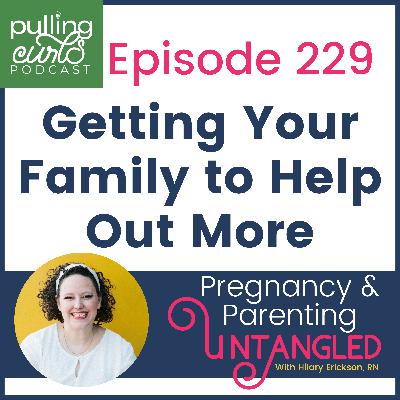


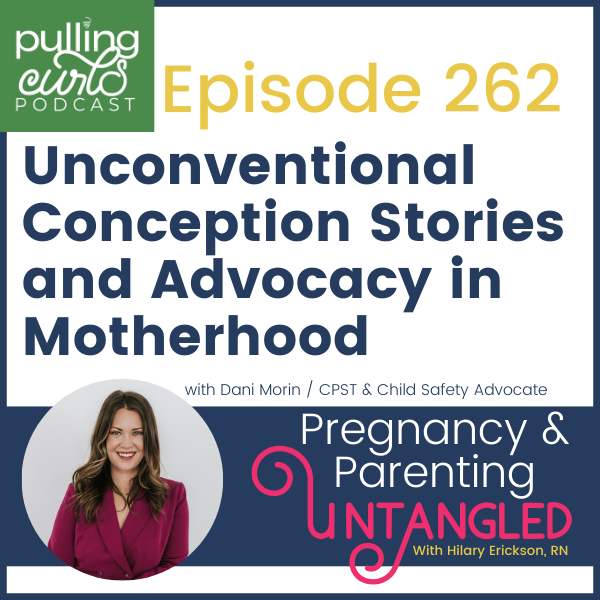
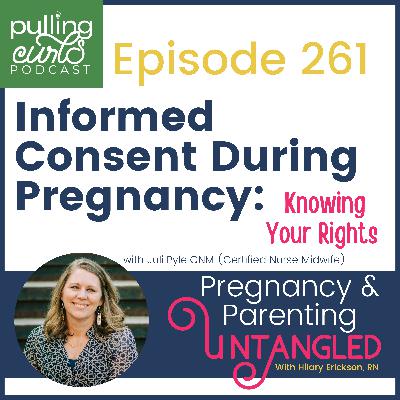
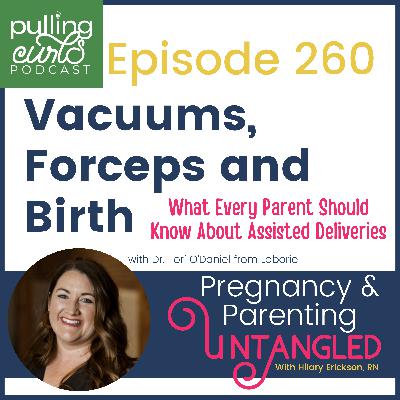
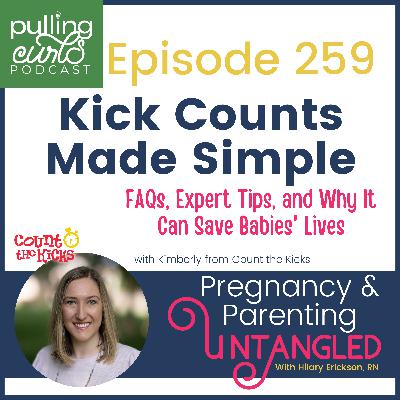
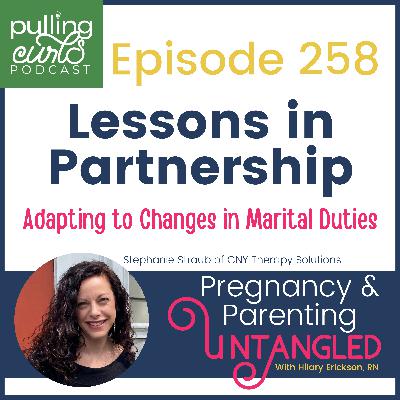
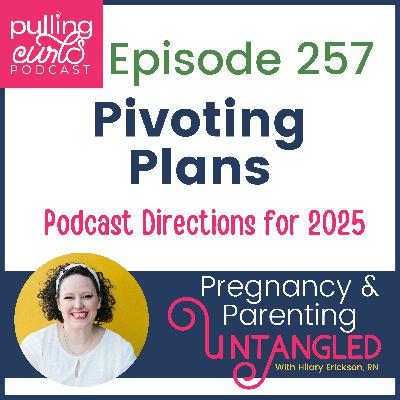
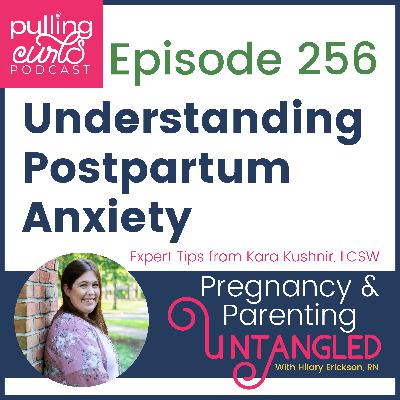

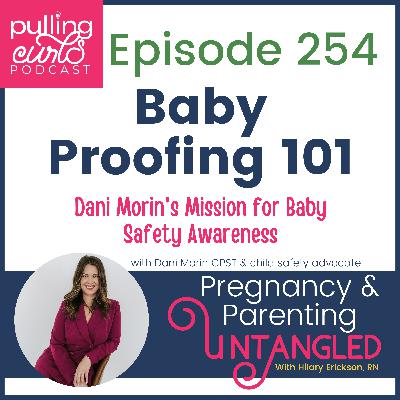
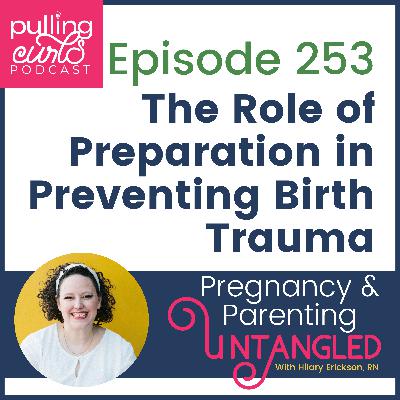
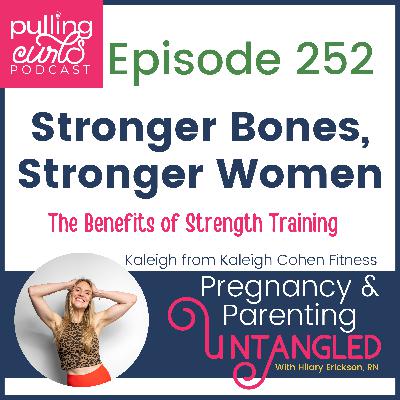
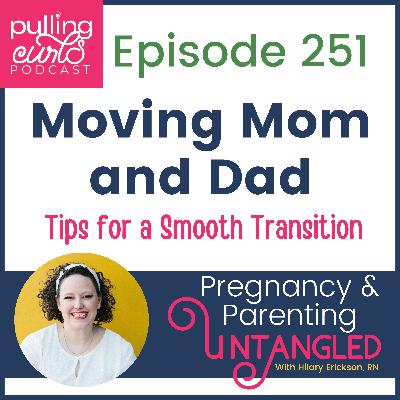
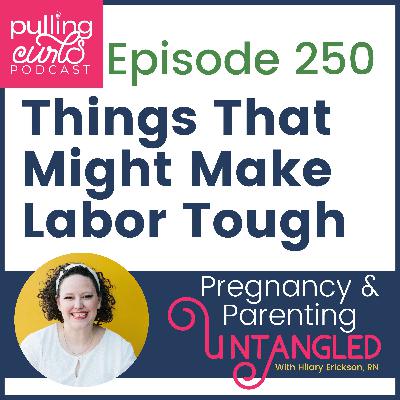
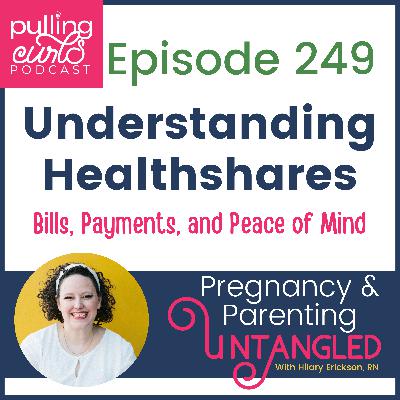
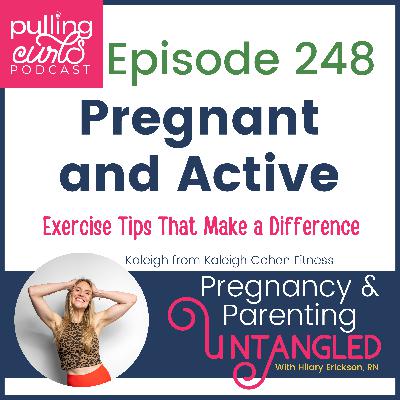

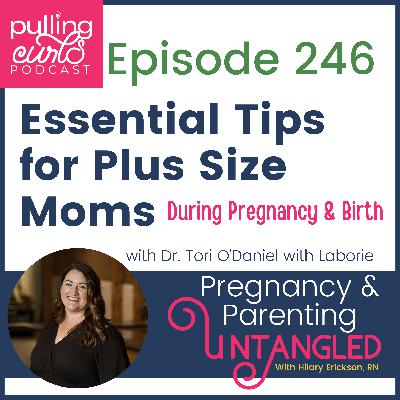



Love this, Hil! You just lay things out so succinctly. I appreciate that about you.